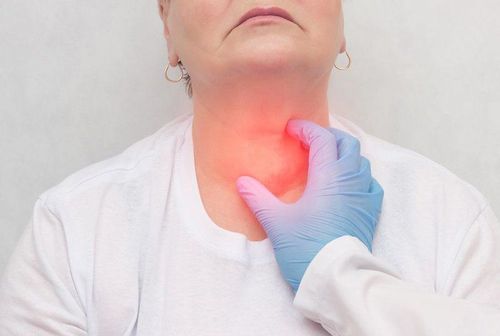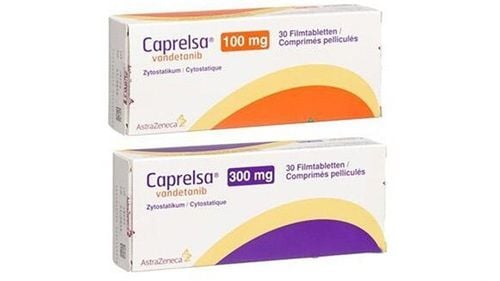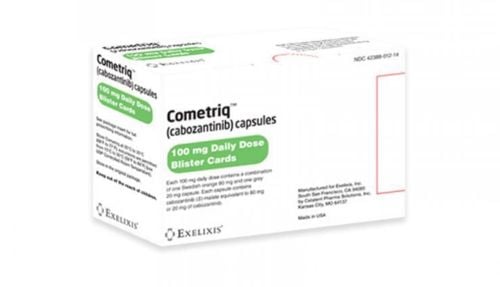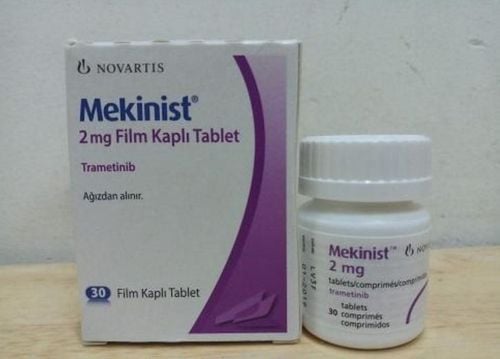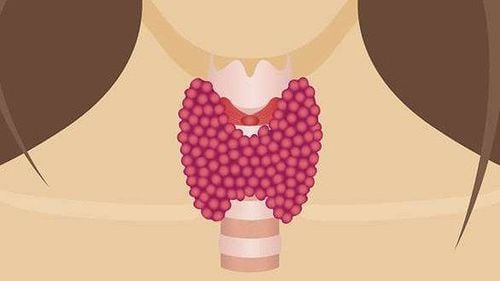This is an automatically translated article.
Posted by Master, Doctor Ha Thi Thu Hien - Pathologist - Laboratory Department - Vinmec Times City International Hospital
Cytological examination plays an important role in the diagnosis of thyroid diseases. They work to reduce the rate of unnecessary thyroid surgery for patients with benign nodules and thyroid cancer. To address the terminology and other issues associated with aspiration cytology, a reporting system has emerged to facilitate effective communication for physicians treating thyroid disease, namely the Bethesda system.
1. Thyroid cytology
Thyroid gland is an endocrine gland, located in the neck trachea, has 2 lobes right and left, connected by a thyroid isthmus, has a triangular part of the thyroid gland that pulls from the upper thyroid isthmus called the pyramidal lobe. . Thyroid cancer is the most common malignancy, accounting for more than 90% of all endocrine cancers.
Aspiration cytology has an essential role in the evaluation of patients with a thyroid nodule. It reduces the incidence of unnecessary thyroid surgery for patients with benign nodules and is surgically appropriate for patients with thyroid cancer. Previously, thyroid cytology was not routinely performed, the rate of surgically removed nodules with a diagnosis of malignancy was 14%. Today, with the practice of routine thyroid cytology, the rate of surgically resected nodules diagnosed with malignancy is greater than 50%. The terms explained during cytology are concise, clear, and useful to the clinician. Historically, the term thyroid cytology has changed from one laboratory to another, creating confusion in some cases and impeding the sharing of clinically meaningful data between multiple institutions. office.
To address terminology and other issues related to thyroid cytology, the National Cancer Institute (NCI) organized the Fine Needle Aspiration Scientific Symposium. The meeting was held on October 22 and 23, 2007, in Bethesda.
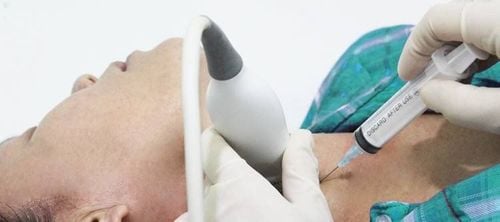
Chọc hút tế bào tuyến giáp giúp chẩn đoán ung thư tuyến giáp
2. Bethesda system for thyroid cytology reporting
National Cancer Institute conference participants acknowledged the importance of developing a uniform terminology for reporting thyroid aspiration results.
A unified reporting system for thyroid cytology will facilitate effective communication between pathologists, endocrinologists, surgeons, radiologists and providers other health care providers that facilitate cytological-histological correlations for thyroid diseases; facilitate research in the epidemiology, molecular biology, pathology and diagnosis of thyroid diseases, especially neoplasia; and enables easy and reliable sharing of data from different laboratories for national and international collaborative studies.
3. Format of the report
For greater clarity, the Bethesda system for thyroid cytology reporting recommends that each report begin with a general diagnostic category:
Undiagnosed or unsatisfactory/ Nondiagnostic or Unsatisfactory Service only cyst/ Cyst fluid only Cellless specimen/ Virtually acellular specimen Other (obscuring blood, clotting artifact, etc ) 2. Benign/ Benign
Matches a benign cyst (includes adenomatoid nodule, colloid nodule, etc.)/ Consistent with lymphocytic (Hashimoto) thyroiditis in the proper clinical context Consistent with granulomatous (subacute) thyroiditis Other/ Other
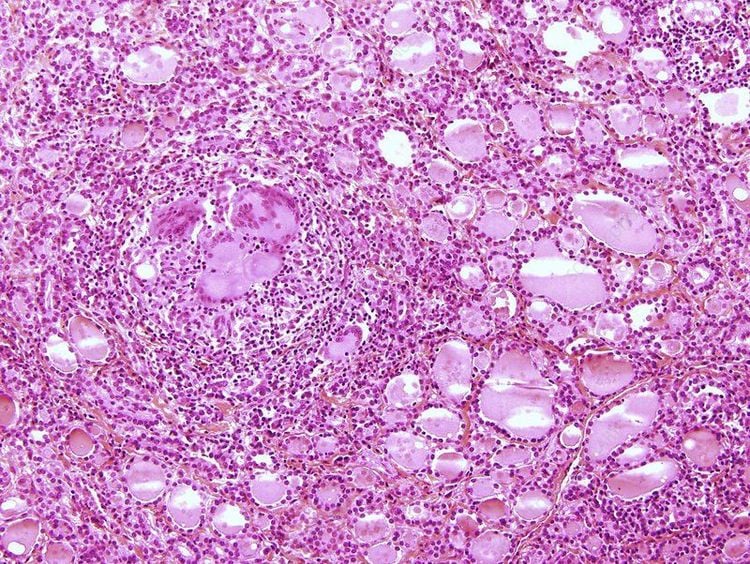
Hình ảnh tế bào viêm tuyến giáp dạng hạt (bán cấp)
Specify if Hürthle cell type/ Specify if Hürthle cell (oncocytic) type 4. Suspicious for Malignancy
Suspicious for papillary carcinoma Suspicious for papillary carcinoma Suspicious for papillary carcinoma Suspicious for medullary carcinoma Suspicious for metastatic carcinoma Suspicious for metastatic carcinoma Suspicious for lymphoma Other/ Other 5. Malignant/ Malignant
Papillary thyroid carcinoma Poorly differentiated carcinoma/ Poorly differentiated carcinoma Medullary thyroid carcinoma Undifferentiated (anaplastic) carcinoma Squamous cell carcinoma/ Squamous cell carci noma Mixed carcinoma / Carcinoma with mixed features (specify) Carcinoma metastasis/ Metastatic carcinoma Non-Hodgkin lymphoma/ Non-Hodgkin lymphoma Other/ Other
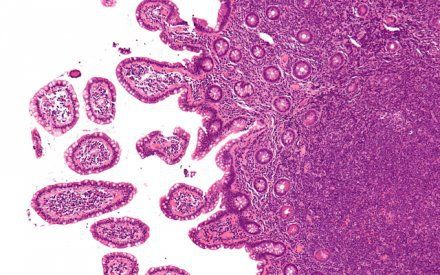
U lympho không Hodgkin
Group 1: Undiagnosed or unsatisfactory risk 1 - 4%, re-aspiration cytology under ultrasound guidance is recommended. Group 2: Benign, risk 0-3%, clinical monitoring is recommended. Group 3: Atypical cells of unspecified significance or cystic lesions of unspecified significance, risk 5-15%, re-exploration is recommended. Group 4: Follicular neoplasia or suspected cystic neoplasia, risk 15-30%, lobectomy recommended. Group 5: Suspected malignancy, 60-70% risk, recommend surgical removal of nearly all thyroid or thyroid lobes. Category 6: Malignant, risk 97 -99, quasi-total thyroidectomy recommended The introduction of the Bethesda system is valuable for its uniformity and consensus in reporting on interpretations aspiration of thyroid cells.
Currently, Vinmec International General Hospital has a package of screening and screening for thyroid diseases. When choosing the Package of Screening and Screening for Thyroid Diseases at Vinmec, you will be examined by experienced thyroid specialists to help screen and detect common thyroid diseases early. variables such as: simple goiter, hyperthyroidism, hypothyroidism, thyroiditis, thyroid nodules, thyroid cancer,...
At the same time, you will have blood tests, evaluate levels of functional hormones thyroid such as FT3, FT4, TSH, Anti - TPO, Anti TG and ultrasound, scan to evaluate the structure of the thyroid gland. After that, when the results are returned to the doctor, you will be consulted about thyroid pathology, and discuss the appropriate treatment options for yourself. From there, thyroid disease will be prevented in time, avoiding long-term health damage in the future.
To register for examination and treatment at Vinmec International General Hospital, you can contact Vinmec Health System nationwide, or register online HERE





